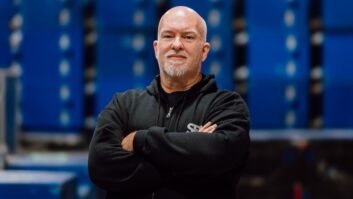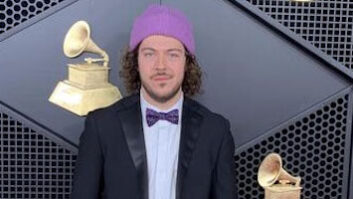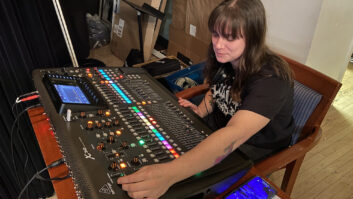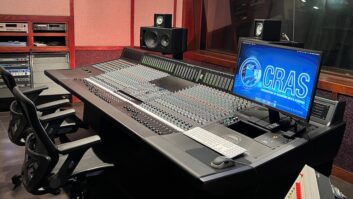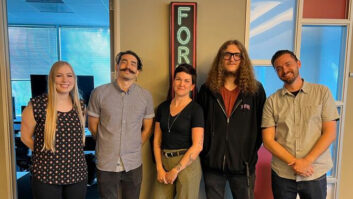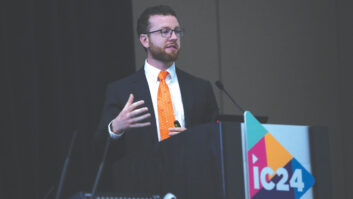Candace Stewart of East West Studios and Paula Salvatore of Universal Music Group Recently Led a Panel Discussion at the School’s Gilbert, Ariz. Campus on the State of the Industry and to Inspire Students Who are About to Graduate and Start Their Careers
Gilbert, Ariz., June 8, 2023 – The Conservatory of Recording Arts & Sciences (CRAS; www.cras.edu), the premier institution for audio engineering education, is proud to announce that it once again recently hosted renowned industry professionals Candace Stewart of East West Studios and Paula Salvatore of Universal Music Group at its Gilbert, Ariz. campus. Stewart and Salvatore led a panel discussion on the state of the industry and to inspire students who are about to start their pro audio careers.
“For 20 years, we have had these two incredible industry leaders selflessly share their perspectives on the audio industry and offer sage advice to our students,” said Kirt Hamm, CRAS administrator. “These two amazing ladies have touched the lives of thousands of our students over the years in an effort to provide the insight and direction that will guide them in the music recording industry as they well know it.”
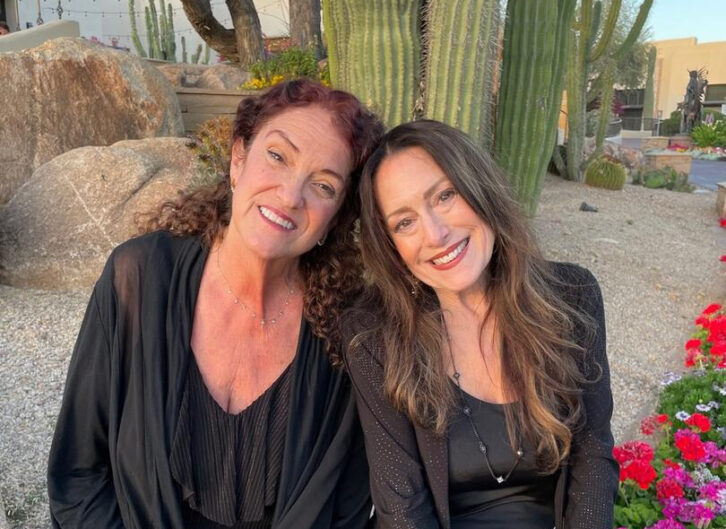
Both Stewart (studio manager at East West Studios), and Salvatore (V.P. Client Relations and Studio Marketing, Universal Music Group) are on the CRAS Advisory Board, and come to the school’s campus once a year to speak to the students about the realities of the industry, what it takes to work in a studio environment, and to provide guidance on the dos and don’ts as a recently turned audio pro in the industry.
They discussed the interviewing process along with how to offer a proper presentation, while also commenting on how to present themselves and make the best impression. Stewart and Salvatore both encouraged them to start their careers by getting as close to their desired job description as possible and practice patience.
“A lot of what we talk about is how we think the students should direct their focus, such as music recording, post, broadcast, etc.,” explained Stewart, who has been the CRAS Advisory Board Chairperson since 2002. “We also gently explain how to manage their expectations and how to allow themselves enough time to really learn all the different skills both technical and social involved in recording engineering. It’s always great to meet the students and hear what they are hoping to achieve, as well as it being quite rewarding to be able to help them along their journeys.”
Stewart has been a studio manager for nearly 40 years and said it has been her privilege to serve artists, engineers, and producers and help bring their musical visions to life. “My advice to the students is to listen to their teachers and learn not only the technical skills required in order to become a successful audio engineer but to also pay attention to the social skills required. Artists are sensitive, and being a good hang and knowing how to ‘read the room’ so that you are an asset to the session and not a distraction. I hire GRAS grads because I know they are getting a great foundation from the curriculum with professionals as their teachers.”
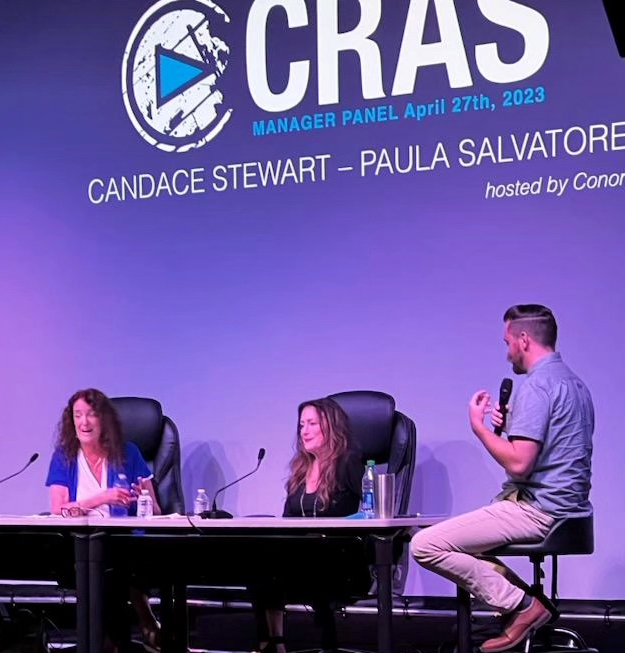
Salvatore agreed with Stewart’s sentiments, and added, “We shared some fun stories about our interaction with artists and how to handle strange situations and keep a sense of humor. We explained some problems and incidents that needed extra care when finding solutions. Most importantly, we expressed the importance of keeping their passions alive and allow time for things to come together and make the most of all encounters.”
With a legacy of managing legendary recording facilities and establishing viable and lasting relationships within the music industry including artists, producers and engineers, Salvatore has enjoyed her continued interaction with CRAS students for the better part of the past two decades.
“By sharing new ideas and industry developments with Kirt (Hamm), the extraordinary CRAS staff and, most importantly, with the eager students, we can inspire the next generation of audio professionals with our personal experiences and stories,” Salvatore continued. “We want to give them an honest and authentic example on how to survive and navigate their career in a creative environment.”
Said CRAS student DAndre Creer, “Candace and Paula gave everyone amazing insight going into the industry, but what stuck out to me was how they were themselves. You could tell that they practiced what they preached and took studio etiquette seriously.”
Added CRAS student AJ Frable, “The presentation was funny, enjoyable, full of good information, and included a lot of industry insight. Hearing [Candace and Paula’s] stories, which were both serious and humorous, helped provide some context as to what students can expect if they go into the studio realm after CRAS.”
The Conservatory of Recording Arts & Sciences is composed of two nearby campuses in Gilbert and Tempe, Ariz. A CRAS education includes broadcast audio, live sound, film and TV audio, music, and video game audio, all taught by award-winning instructors who have all excelled in their individual fields, including sound reinforcement, audio recording and production, digital recording, troubleshooting/maintenance, and music business.
CRAS structured programs and highly qualified teaching staff provide a professional and supportive atmosphere, which is complemented by its small class sizes allowing for individual instruction and assistance for students in engineering audio recordings. CRAS has been providing quality vocational training in audio recording for more than three decades. The curriculum and equipment are constantly being updated to keep pace with the rapid advancements in the music and sound recording industries. CRAS’ course offerings and subject matter have always centered around the skills and knowledge necessary for students’ success in the audio recording industries.
The 11-month program is designed to allow every student access to learn and train in all of the Conservatory’s studios which are comprised with state-of-the-art audio recording and mixing gear, the same equipment used in today’s finest studios and remote broadcast facilities, including Pro Tools 12, API Legacy consoles, SSL AWS consoles, Studer Vista consoles, and much more. All students must complete a 280-hour industry internship to graduate from the Master Recording Program II that may ultimately lead to industry employment.
For more information on the Conservatory of Recording Arts & Sciences, please visit www.cras.edu, contact Kirt Hamm, administrator, at 1-800-562-6383, or email to info@cras.edu.
About The Conservatory of Recording Arts & Sciences
Based in the heart of The Valley of the Sun with two campuses in Gilbert and Tempe, Ariz., The Conservatory of Recording Arts & Sciences (CRAS) is one of the country’s premier institutions for audio education. The Conservatory has developed a unique and highly effective way to help the future audio professional launch their careers in the recording industry and other related professional audio categories.
-30-
